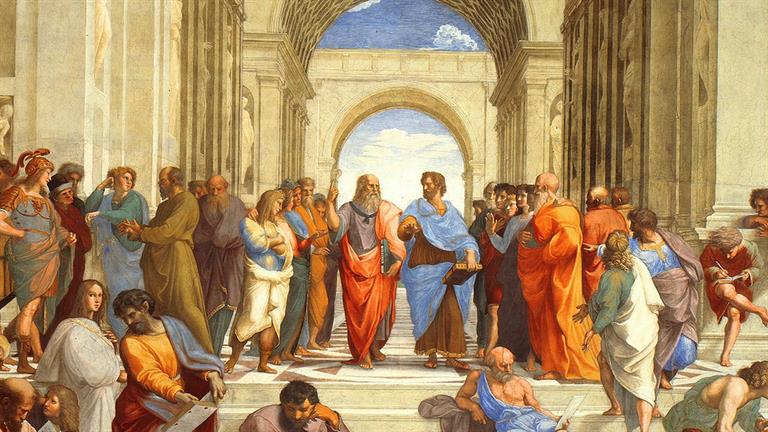|
HEY GAL posted:well until roughly fifteen minutes ago, nobody read these things absent a thousand years of interpretation and ongoing conversation about the text, which we call "tradition" for short Sure, but there has to be a reason we founded our tradition on this stuff in particular. Is it just the miracles? Lots of guys do miracles. HEY GAL posted:also the pharisee is in the wrong because "thank you that I'm cooler than other people" is something a douche would say when they pray, it's smug and gross. StashAugustine posted:TBH I'm not really sure where you're coming from here. There are some obfuscated parables but that one always seemed pretty clear to me- the Pharisee makes a show of being religious because he thinks he's better than everyone else but he's blind to his own faults and pride; while the tax collector (btw tax collectors are whipping boys a lot in the Gospels because a) they were tied to the Romans who were, uh, not terribly popular with the Jews and b) Roman tax collectors were basically paid off what they could extort from people) acknowledges his faults and asks God for mercy. Those who think they're the best are inherently prideful but those who recognize their flaws will be forgiven. Sure, but let's assume the pharisee is actually a fine dude in general (after all, the text doesn't state otherwise). Is he also supposed to beat his chest and stare at the floor in shame? And anyway, I think it's pretty dangerous to recommend constant self-deprecation and shame as a religious practice. The bit about tax collectors is an interesting bit of trivia, but still - I get why robbers and thieves are bad, but is the tax collector really in the same category? Would a robber or thief also be "justified" just by beating himself up a bit? The Phlegmatist posted:Why would the tax collector be justified and the Pharisee not? I mean, serious question here. What do you think? I guess it has to do with the tax collector judging himself and the pharisee "judging" others, as in the parable about the board in a guy's eye. But I don't really know because I don't know what "justified" is supposed to mean. Justified in relation to what?
|
|
|
|

|
| # ? May 10, 2024 07:50 |
|
oh boy now it's time to talk about justification for 2 pages
|
|
|
|
Tuxedo Catfish posted:still uses 3d6 in order Yay, though I walk through the Tomb of Horrors I fear no Sphere of Annihilation...
|
|
|
|
pidan, you might want to take a look at this commentary (in German) on the part of Luke you posted. I'm not a theologian, so maybe it's actually bad or something, but to my layman's eyes it looked like a good explanation of the nuances hidden in the text
|
|
|
|
pidan posted:Sure, but there has to be a reason we founded our tradition on this stuff in particular. Is it just the miracles? Lots of guys do miracles. "Justified" here means the punishment associated with your misdeeds is nullified. Like self-defense is a justifiable homicide - you still killed the guy, but there is no punishment for it. The point of the passage is that God knows what you have or haven't done, he knows the state of your soul. Putting on a big show as to how contrite you are is nothing but a show to impress your neighbors - and you'd better hope your neighbors are impressed, because God isn't. The tax collector's prayer was heard, the Pharisee's wasn't. Your sins are between you and God. Confess them humbly and quietly, and you will be forgiven. That's all you need to do.
|
|
|
|
pidan posted:I guess it has to do with the tax collector judging himself and the pharisee "judging" others, as in the parable about the board in a guy's eye. But I don't really know because I don't know what "justified" is supposed to mean. Justified in relation to what? Justification is a legal term. That's when God declares you not guilty of your sins because He can't even see them anymore since you're clothed in Christ's righteousness (I think this might be a Reformed thing, not sure though.) Anyway here's Calvin's commentary, which has nothing to do with justification but is actually pretty important for people who argue about theology online. quote:Christ now gives directions about another virtue, which is necessary to acceptable prayer. Believers must not come into the presence of God but with humility and abasement. No disease is more dangerous than arrogance; and yet all have it so deeply fixed in the marrow of their bones, that it can scarcely be removed or extirpated by any remedy. It is no doubt strange that men should be so mad as to venture to raise their crests against God, and to plead their own merits before him. Though men are carried away by their ambition, yet when we come into the presence of God, all presumption ought to be laid aside; and yet every man thinks that he has sufficiently humbled himself, if he only presents a hypocritical prayer for forgiveness. Hence we infer that this warning which our Lord gives was far from being unnecessary.
|
|
|
|
The Phlegmatist posted:Justification is a legal term. That's when God declares you not guilty of your sins because He can't even see them anymore since you're clothed in Christ's righteousness (I think this might be a Reformed thing, not sure though.)
|
|
|
|
pidan posted:Sure, but there has to be a reason we founded our tradition on this stuff in particular. Is it just the miracles? Lots of guys do miracles. St. Thomas Aquinas quotes St. Augustine in the Catena Aurea here: quote:If you look into his words, you will find that he asked nothing of God. He goes up indeed to pray, but instead of asking God, praises himself; and even insults him that asked. The Publican, on the other hand, driven by his stricken conscience afar off, is by his piety brought near.
|
|
|
Worthleast posted:St. Thomas Aquinas quotes St. Augustine in the Catena Aurea here: And it's worth remembering that self-love is, for Augustine, really the true origin of sin; there are two cities, one of the contempt of god and the love of self, the other of the contempt for self and the love of god.
|
|
|
|
|
Expanding on StashAugustine's tax collector trivia: if you were a tax collector for the Romans you were either part of the occupation machine or collaborating with it (which might be even worse depending on the point of view). This in itself might be viewed by some as a crime against the God's chosen people but it's not something Jesus seemed to mind at all. The worse thing is that yes, tax collectors were often almost legalized thieves. They had the protection of the Romans so you couldn't really touch them and get away with it and they told you how much taxes you had to pay. Because they themselves needed to live, they collected more than what they had to pay forward. Combined with the aforementioned immunity that's world's easiest get-rich-scheme. Want some cash? Tell people they need to pay more and keep the extra.
|
|
|
|
Thank you all for taking the time to answer, but I don't think you're addressing my criticism at all. Basically I'm asking - why is it such a good idea to humble yourself, and who gave Jesus the authority to tell people to do that, and why didn't he explain it better, and your answer is essentially "it's good to be humble". My question is not so much "what is this text trying to say", it's more "what is supposed to be the benefit of paying attention to this badly argued story. The Calvin text really is a great illustration of this problem, essentially saying that we should obey this text because God said it, but if he did, why didn't he explain some of the assumptions inherent in that recommendation. Does this make sense to you? Essentially, I can't just take Jesus at his word because he's God, after all, I have to accept his words to believe that he's God in the first place. It's circular reasoning. The Muslims at least claim that their holy book is so well written only God could have done it, Christians don't even have that.
|
|
|
|
A number of Jesus' parables have the broad theme of "the person you'd expect from their station in the world to be the good, righteous heroic person is actually in the wrong, and the person you'd expect to be the lowest of the low is actually the example you should be following".
|
|
|
pidan posted:Thank you all for taking the time to answer, but I don't think you're addressing my criticism at all. Basically I'm asking - why is it such a good idea to humble yourself, and who gave Jesus the authority to tell people to do that, and why didn't he explain it better, and your answer is essentially "it's good to be humble". I mean, you're essentially just making an argument about religion in general here rather than anything that concerns the parable in particular. quote:The Calvin text really is a great illustration of this problem, essentially saying that we should obey this text because God said it, but if he did, why didn't he explain some of the assumptions inherent in that recommendation. There's a whole big argument here in basic theology about whether god wills things because they're good or they're good because god wills them, it's a fundamental tension in Islam and in Christian theology. Having said that, I don't think the onus is fully on us to establish why humility is a significant ethical value, since after all it's one that appears as a positive value across all ethical systems, including secular ones. Why don't you try to establish something about what your reaction is to the parable and why the proposed solutions don't seem moral, 'authority' put to one side.
|
|
|
|
|
pidan posted:Thank you all for taking the time to answer, but I don't think you're addressing my criticism at all. Basically I'm asking - why is it such a good idea to humble yourself...
|
|
|
|
pidan posted:Does this make sense to you? Essentially, I can't just take Jesus at his word because he's God, after all, I have to accept his words to believe that he's God in the first place. It's circular reasoning. The Muslims at least claim that their holy book is so well written only God could have done it, Christians don't even have that. HEY GAL posted:well until roughly fifteen minutes ago, nobody read these things absent a thousand years of interpretation and ongoing conversation about the text, which we call "tradition" for short The Gospels were written by the Church, for the Church to use; you'd be taking Jesus at his word because you'd already be accepting his words, and these would be some of those words you'd be accepting. In turn you'd be accepting them because they were part of the tradition of the community you worshipped with. We might argue over what the text was trying to say, but it'd be in that context. I mean, you asked, "Why is it a good idea to humble yourself, and who gave Jesus the authority to tell people to do that," and it seems like you're expecting that to be in the text already? But in a lot of ways the Bible is the Cliff Notes for the entirety of Sacred Tradition. It isn't going to contain those explanations. Even where later parts reference earlier parts, that reference isn't always made explicit.
|
|
|
|
pidan posted:Thank you all for taking the time to answer, but I don't think you're addressing my criticism at all. Basically I'm asking - why is it such a good idea to humble yourself, and who gave Jesus the authority to tell people to do that, and why didn't he explain it better, and your answer is essentially "it's good to be humble". You're basically asking us to prove God exists and that Jesus is a manifestation thereof. Good luck with that.
|
|
|
|
pidan, you might be mixing up self-esteem with the kind of "more ego boosts for me, gently caress you" mentality described. I mean, "love thy neighbor as yourself" is kind of empty if you don't love yourself. And that kind of love for yourself is not what the example given is about.
|
|
|
|
Deteriorata posted:You're basically asking us to prove God exists and that Jesus is a manifestation thereof. Good luck with that. I'm not asking for proof, I'm just asking what people's reasons are for believing it. It's not so much that I want to be convinced, I just want to understand. Like, I've never met a Buddhist who goes "I really struggle with this text but I think God must be trying to tell me something here". But for Christians are all about believing things because they're in scripture. As for the value of humility, my point is just that the text makes no argument for it at all, it just goes "humility: God approves", and 100% of the reasoning is filled in by the reader. Edit: I guess my instinct is that there must be some technical meaning to the terms the text uses, so that there is some solid explanation there if you just understand the definition and contexts of the words. But maybe it really is like zonohedron says and is just a shorthand note about an ongoing discussion. Like, the sayings of Confucius don't make too much sense as soundbytes, but when you look at the discursive context it's much clearer. pidan fucked around with this message at 22:54 on Oct 20, 2016 |
|
|
pidan posted:Like, I've never met a Buddhist who goes "I really struggle with this text but I think God must be trying to tell me something here". But koans. Their central purpose is to provoke this kind of reaction. There is an element of this in all religions.
|
|
|
|
|
Disinterested posted:But koans. Their central purpose is to provoke this kind of reaction. There is an element of this in all religions. mo tzu and paramemetic, get in here
|
|
|
|
If this were a fable which ended poorly after similar premises, would you find it similarly morally non instructive?
|
|
|
|
|
pidan posted:I'm not asking for proof, I'm just asking what people's reasons are for believing it. It's not so much that I want to be convinced, I just want to understand. One of the fundamental themes of the Bible is putting God first, others second, and yourself last. The parable is just one of hundreds of illustrations of the concept. The Pharisee is putting himself first - he's not praying, he's putting on a show starring him. The publican puts God first, sincerely asking for forgiveness. That's all there is to it.
|
|
|
|
HEY GAL posted:is that not the entire point of the sudden enlightenment school i don't know but i do know "believing things because they're in scripture" is a preeeetty big thing for shin buddhists i mean our entire belief system is based on the primal vow of the amida buddha, that all who call upon his name with a faithful heart will be reborn in his pure land and become buddhas.
|
|
|
|
pidan posted:As for the value of humility, my point is just that the text makes no argument for it at all, it just goes "humility: God approves", and 100% of the reasoning is filled in by the reader. The parables are supposed to be a little bit opaque without interpretation - not totally impenetrable, but even the disciples who traveled with Jesus often had to ask him, "Okay, what's that supposed to mean?" The value of humility before God is threaded all through the Bible, so his listeners would have picked up on that; the unexpected part was that it was the tax collector being humble, and the implication that they, good Jews, might find anything to emulate in a Roman collaborator.
|
|
|
|
Particularly since there is a Roman topos of the virtuous self-glorifying.
|
|
|
|
|
pidan posted:Like, I've never met a Buddhist who goes "I really struggle with this text but I think God must be trying to tell me something here". But for Christians are all about believing things because they're in scripture. i think my advice to you would honestly be to stop with the Orientalism
|
|
|
|
and to maybe spend more than two minutes on Wikipedia when it comes to how the Bible and Christianity are related to each other
|
|
|
|
It's also a pre-enlightenment text. You can't expect rational step-by-step proofs explaining why humility is a virtue. It's taken for granted that humility is a virtue. It's not the job of the text to convince you of that.
|
|
|
|
HEY GAL posted:society works better if everyone is humble and tries to help others. it's in your rational self interest to foster such a world. I would say society works better if people are happy, and people are happier if they help and care for each other but fall short of Augustinian "contempt for self." One helps others because they have the same dignity and ability to experience suffering that you do, and don't like it any more than you do. To help others out of contempt for yourself and your own needs/desires is both bizarre and unsustainable.
|
|
|
|
I like the tax collector as the ultimate example of a sinner, though, it lacks that too-clean division between religious and political life. 
|
|
|
|
pidan posted:Thank you all for taking the time to answer, but I don't think you're addressing my criticism at all. Basically I'm asking - why is it such a good idea to humble yourself, and who gave Jesus the authority to tell people to do that, and why didn't he explain it better, and your answer is essentially "it's good to be humble". It feels like you're still asking two questions. 1 why is it such a good idea to humble yourself. 2 why are the Gospels more real than any other text. 1. I think you're reading this whole passage wrong, and I could go on at length about that but it seems like your're interested in 2 2. And I have no clear answer. All I can say is that the Gospels have worked for me, where no other texts have. They've answered questions, and given strength, where nothing else did. And I don't think it's about literary quality, because I spent most my adult life working among texts by the most wonderful writers, but I still get drawn back to these badly translated Greek-Jewish chroniclers. Maybe we're just idiots chasing a piece of straw down a plughole.
|
|
|
|
Tuxedo Catfish posted:I would say society works better if people are happy, and people are happier if they help and care for each other but fall short of Augustinian "contempt for self."
|
|
|
|
HEY GAL posted:where did i say contempt for self? i said humility You didn't, I was using your post as a springboard to address this: Disinterested posted:And it's worth remembering that self-love is, for Augustine, really the true origin of sin; there are two cities, one of the contempt of god and the love of self, the other of the contempt for self and the love of god.
|
|
|
|
Tuxedo Catfish posted:You didn't, I was using your post as a springboard to address this:
|
|
|
Tuxedo Catfish posted:I would say society works better if people are happy, and people are happier if they help and care for each other but fall short of Augustinian "contempt for self." The Augustinian attitude to man is probably too harsh, Aquinas gently softens it. A post on this coming Soon.
|
|
|
|
|
Disinterested posted:The Augustinian attitude to man is probably too harsh rodrigo diaz had no idea we canonized him too, for instance
|
|
|
|
Now you have to come full circle and realise neoplatonism is to blame and renounce it.
|
|
|
|
|
Disinterested posted:Now you have to come full circle and realise neoplatonism is to blame and renounce it.
|
|
|
HEY GAL posted:without neoplatonism we're just slavic/balkan paganism with blingier hats 
|
|
|
|
|

|
| # ? May 10, 2024 07:50 |
|
what's happening where are their hats? WHERE ARE THEIR HATS
|
|
|




























